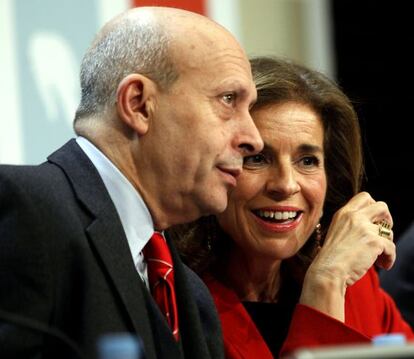Madrid 2020 “urgent and essential for boosting regeneration,” says bid
Hoping for third time lucky, capital unveils its “realist” Olympic candidacy

Madrid made public its bid to host the 2020 Olympics on Tuesday, calling it an “urgent and essential project for generating future opportunities, and boosting the country’s regeneration.”
The document, which officials handed in to the International Olympic Committee in Lausanne, Switzerland on Monday, outlines a Games that would cost four billion euros, earn 2.4 billion euros and create an estimated 320,000 jobs.
The bid boasts a “realist and conservative” approach, promising “to minimize all possible risk of budgetary imbalances,” with the deficit being taken on by the government coffers.
It also emphasizes the city’s “tenacity” — given that this is its third consecutive bid for the Games, having lost out to London 2012 and Rio de Janeiro 2016.
This time around, it’s so far, so good for the Spanish capital. Madrid outscored its rivals to make it through the first cut in May 2012, receiving 8.08 points over Tokyo’s 8.02 and Istanbul’s 6.98.
The IOC is due to visit the Spanish capital between March 18 and 21, and the city has to give its technical presentation in June. The evaluation report will be made public in August, before the winning city is announced in Buenos Aires on September 7.
If successful, Madrid will host the Summer Olympics between August 7 and 23, 2020 and the Summer Paralympics between September 11 and 22, 2020.
Preparing the city is set to cost 1.593 billion euros — to come principally from the public coffers — while the Games themselves are predicted to cost 2.419 billion euros, which will come from ticket sales, sponsors and other sources.
The presentation on Tuesday of the report at the Palacio de Cibeles, the seat of the city government, was attended by, among others, Education, Culture and Sports Minister José Ignacio Wert, Madrid regional premier Ignacio González and city mayor Ana Botella, all from the conservative Popular Party (PP).
The bid has the backing of all three tiers of government, as well as the PP and the Socialist Party. The United Left grouping and centrist Union, Progress and Democracy party have rejected the bid.
The candidacy also has the support of King Juan Carlos and claims to have “the faithful backing of 80 percent of Spaniards,” based on two polls carried out between December 27, 2011 and January 11, 2012 and September 10 and 14, 2012.
“The 2020 Games represent the opportunity to reactivate our economy around a unique project,” concludes the letter from the three tiers of government that precedes the document.
In his own note accompanying the bid, Spanish Olympic Committee chief Alejandro Blanco adds: “As occurred with the Barcelona Games in 1992, we want Madrid 2020 to represent an upturn in Spanish sport.”
Given the city’s previous Olympic bids, much of the infrastructure for the 2020 Games has already been constructed. In keeping with its plans for a “viable and economically sustainable event,” its slogan up to now has been: “We have 80 percent built.”
Nevertheless, four new sport centers still need to be constructed: the white-water center at La Gavia for the canoeing events; the shooting center in Paracuellos de Jarama; the gymnastics pavilion; and the rowing center.
The Olympic village and the media center also await construction.
Tu suscripción se está usando en otro dispositivo
¿Quieres añadir otro usuario a tu suscripción?
Si continúas leyendo en este dispositivo, no se podrá leer en el otro.
FlechaTu suscripción se está usando en otro dispositivo y solo puedes acceder a EL PAÍS desde un dispositivo a la vez.
Si quieres compartir tu cuenta, cambia tu suscripción a la modalidad Premium, así podrás añadir otro usuario. Cada uno accederá con su propia cuenta de email, lo que os permitirá personalizar vuestra experiencia en EL PAÍS.
¿Tienes una suscripción de empresa? Accede aquí para contratar más cuentas.
En el caso de no saber quién está usando tu cuenta, te recomendamos cambiar tu contraseña aquí.
Si decides continuar compartiendo tu cuenta, este mensaje se mostrará en tu dispositivo y en el de la otra persona que está usando tu cuenta de forma indefinida, afectando a tu experiencia de lectura. Puedes consultar aquí los términos y condiciones de la suscripción digital.








































